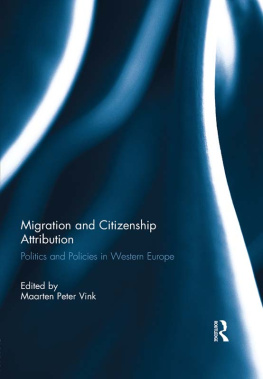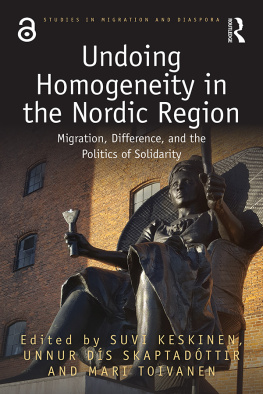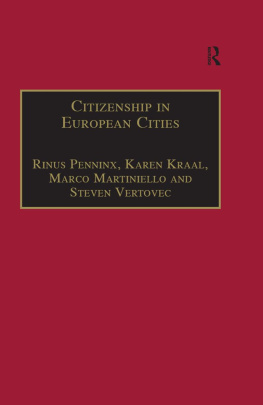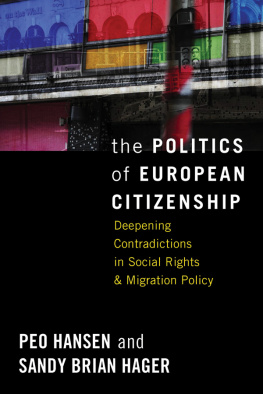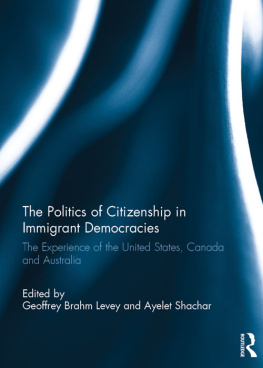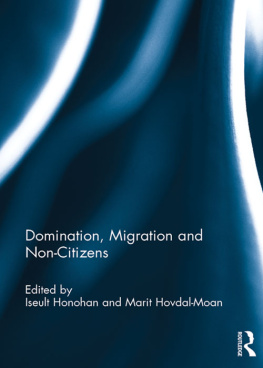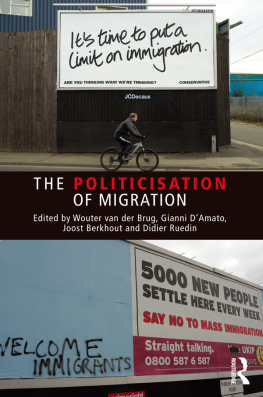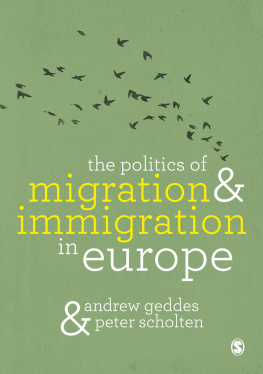Migration and Citizenship Attribution
How do states in Western Europe deal with the challenges of migration for citizenship? The legal relationship between a person and a state is becoming increasingly blurred in our mobile, transnational world. This volume deals with the membership dimension of citizenship, specifically the formal rules that states use to attribute citizenship. These nationally-specific rules determine how and under what conditions citizenship is attributed by states to individuals: how one can acquire formal citizenship status, but also how this status can be lost.
Migration and Citizenship Attribution observes various trends in citizenship policies since the early 1980s, analysing historical patterns and recent changes across Western Europe as well as examining specific developments in individual countries. Authors explore the equal treatment of women and men with regard to descent-based citizenship attribution, along with the process of convergence between countries with ius soli and ius sanguinis traditions with regard to birthright provisions. They consider how the increasing acceptance of multiple citizenship is reflected in a dual trend to abolish, or at least to moderate, the renunciation of the citizenship of origin as a condition for naturalisation, and also to restrict provisions of loss of citizenship due to voluntary acquisition of a foreign citizenship. Another trend observed and discussed is the introduction by many countries of language tests and integration conditions in the naturalisation procedure, with some countries now concluding the naturalisation process by means of a US-styled citizenship ceremony. Contributors also explore the various things taken into account under state citizenship laws such as statelessness, or membership of the European Union.
This book was originally published as a special issue of the Journal of Ethnic and Migration Studies.
Maarten Peter Vink is Associate Professor of Political Science at Maastricht University, The Netherlands. He has published extensively on citizenship and migration and is part of the managing consortium of the EUDO CITIZENSHIP Observatory. He is the author of Limits of European Citizenship (2005) and co-editor of Europeanization: New Research Agendas (2007).
Migration and Citizenship Attribution
Politics and Policies in Western Europe
Edited by
Maarten Peter Vink
First published 2012
by Routledge
2 Park Square, Milton Park, Abingdon, Oxon, OX14 4RN
Simultaneously published in the USA and Canada
by Routledge
711 Third Avenue, New York, NY 10017
Routledge is an imprint of the Taylor & Francis Group, an informa business
2012 Taylor & Francis
This book is a reproduction of the Journal of Ethnic and Migration Studies, volume 36, issue 5. The Publisher requests to those authors who may be citing this book to state, also, the bibliographical details of the special issue on which the book was based.
All rights reserved. No part of this book may be reprinted or reproduced or utilised in any form or by any electronic, mechanical, or other means, now known or hereafter invented, including photocopying and recording, or in any information storage or retrieval system, without permission in writing from the publishers.
Trademark notice: Product or corporate names may be trademarks or registered trademarks, and are used only for identification and explanation without intent to infringe.
British Library Cataloguing in Publication Data
A catalogue record for this book is available from the British Library
ISBN13: 978-0-415-50283-2
Typeset in Times New Roman
by Taylor & Francis Books
Publisher's Note
The publisher would like to make readers aware that the chapters in this book may be referred to as articles as they are identical to the articles published in the special issue. The publisher accepts responsibility for any inconsistencies that may have arisen in the course of preparing this volume for print.
Contents
Maarten P. Vink and Gerard-Ren de Groot
Marc Morj Howard
Sara Wallace Goodman
Evelyn Ersanilli and Ruud Koopmans
Marc Helbling
Iseult Honohan
Dora Kostakopoulou
Rainer Baubck
Rainer Baubck holds a Chair in Social and Political Theory in the Department of Political and Social Sciences at the European University Institute, in Florence, Italy. He is on leave from the Institute for European Integration Research at the Austrian Academy of Sciences, where he is also vice-chair of the Academy's Commission for Migration and Integration Research.
Gerard-Ren de Groot is Professor of Comparative and Private International Law at Maastricht University, the Netherlands, and Professor of Private Law at the University of Aruba.
Evelyn Ersanilli is Departmental Lecturer in Migration Studies at the Department of International Development, University of Oxford, United Kindgom.
Marc Helbling is Head of the Emmy-Noether research group Immigration Policies in Comparison (IMPIC) at the Social Science Research Center Berlin (WZB).
Iseult Honohan is Senior Lecturer in the School of Politics and International Relations at University College Dublin, Ireland.
Ruud Koopmans is Director of the Migration, Integration, Transnationalization research unit at the Wissenschaftszentrum Berlin fr Sozialforschung (WZB) and Professor of Sociology at the Vrije Universiteit Amsterdam, the Netherlands.
Dora Kostakopoulou is Professor of European Union Law and European Integration at the University of Southampton, and Director of the Centre for European Law (CELS).
Marc Morj Howard is Professor in the Department of Government at Georgetown University, USA.
Maarten Peter Vink is Associate Professor of Political Science at Maastricht University, the Netherlands.
Sara Wallace Goodman is Assistant Professor of Political Science at the University of California Irvine, USA.
Maarten P. Vink and Gerard-Ren de Groot
This special issue of JEMS deals with the challenges of migration for citizenship attribution in Western Europe. In this introductory paper we analyse recent developments in citizenship attribution across Western Europe over the past 25 years. Despite the contradictory impact of the instrumentalisation and politicisation of citizenship policies, and the fact that countries have different citizenship traditions and migration experiences, we observe six broad trends. These relate to the descent-based transmission of citizenship by women, men and emigrants; ius soli provisions for second- and third-generation immigrants; the acceptance of multiple citizenship; the introduction of language and integration requirements for naturalisation; the avoidance of statelessness; and the increasing relevance of EU membership. We describe the background and core features of each of these six trends and provide empirical examples from citizenship policies in 18 West European countries since the early 1980s.
Introduction
As a person of international law, according to the 1933 Montevideo Convention on the Rights and Duties of States, a state requires not only a defined territory, a government and the capacity to enter into relations with other states, but also a permanent population. Without individual members a state cannot exist. To signify the importance of citizenship, or nationality as it is often coined in legal terminology, states endow privileges upon their citizens, for example by giving them a passport that grants privileged access to the territory of a state and its befriended states. Other prerogatives include the exclusive access to public positions and to participation in democratic elections, and the possibility to benefit from welfare-state arrangements. This privileged status of citizens signifies their importance as the constituent population of a state.


